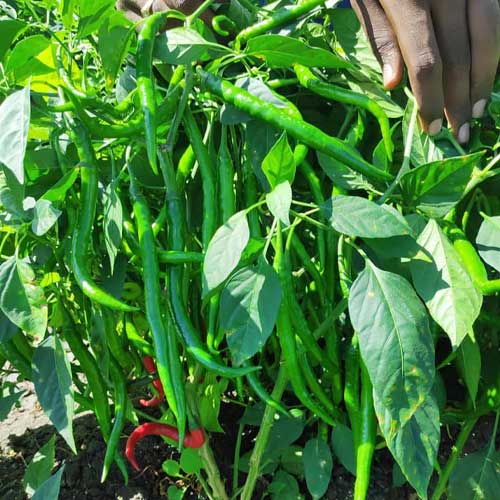Total Number of seeds: 150
Chilli Pusa Jwala Pepper Seeds produce medium-tall plants with profuse branching and a high yield of long, slender fruits. The fruits start off dark green and turn deep red upon maturity, adding vibrant color and spicy flavor to your dishes. This variety is known for its upright bearing habit, with each bunch producing 10-12 fruits that are 2.5 to 3.5 inches long. The Pusa Jwala Pepper is highly pungent, making it perfect for those who love a fiery kick in their food. The plants are tolerant to leaf curl virus, ensuring healthy growth and a bountiful harvest throughout the growing season.


What Size Grow Bag is Best?
In India, Chilli Pusa Jwala Pepper Seeds are best sown during the spring (February to March) and summer (June to July). These plants thrive in warm, sunny conditions and produce a high yield of slender, fiery peppers that are perfect for spicing up a variety of traditional Indian dishes.
1. Apply Nutrient-Rich Fertilizers
When your plants begin flowering, use nutrient-rich fertilizers like Organic Bone Meal Powder or Vermicompost. This helps in boosting the bloom and enhances overall yield.
2. Use Organic Fertilizers
Feed your plants with organic fertilizers such as Cow Dung Manure or Neem Cake. Organic options promote healthy soil life.
3. Regular Feeding
Apply fertilizers every 20-25 days to ensure plants receive a steady supply of nutrients. Choose from various options like Cocopeat Compost for moisture retention.
Chilli Pusa Jwala is known for its high pungency and slender fruits that are ideal for making spicy dishes, sauces, and pickles. The plants are prolific bearers and are also known for their tolerance to leaf curl virus, making them easy to grow in various conditions.
Chilli Pusa Jwala is rich in capsaicin, vitamin C, and essential minerals. It is perfect for adding heat and flavor to curries, stir-fries, and chutneys. The peppers are also known for their health benefits, such as boosting metabolism and supporting immune health.
When growing Chilli Pusa Jwala Pepper Seeds, ensure the soil is loose and well-draining to support proper root development. Water regularly to keep the soil moist but avoid waterlogging. Monitor for pests and diseases to keep the plants healthy.
Common issues include pests like aphids and diseases like root rot. To prevent these problems, ensure good airflow and use organic pest control methods. Remove affected leaves to avoid disease spread.
Sign in now to receive a 5% instant discount on your first order when using code WELCOME. Begin your organic journey today!
By logging in, you're agreeing to our Terms of Service and Privacy Policy.
Gokul
Roz pani diya toh chilli seedlings steady grow kar rahe hain
Sameer Khan
The seedlings look good so far and the leaves look fresh in early stage.
Kiran
The seedlings look good so far and sprouting happened evenly from the start.
Rupa
The seedlings look good so far and sprouting happened evenly from the start.
Suhail
The seedlings look good so far and the seedlings look stable so far.
Rafiq S
Seeds ka germination accha hua, sprouts strong nikal aaye
Joel K
Sprouting accha hua and seedlings rising evenly
Vishal Deshmukh
The seedlings look good so far and the leaves look fresh in early stage.
Asha
The seedlings look good so far and plant structure looks firm.
Farhan
Seedlings healthy aur balanced lag rahe hain